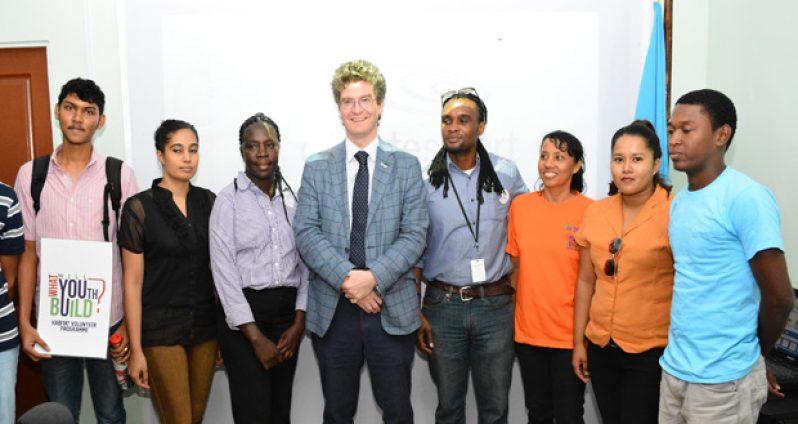HABITAT for Humanity, in partnership with the British High Commission in Georgetown, on Thursday launched a ‘Climate Smart Project’ at the Civil Defence Commission (CDC) in Thomas Lands. The project is aimed at integrating Climate Change adaptation with Habitat for Humanity’s Disaster Risk Reduction Strategy, change vital actions that produce unhealthy behaviours leading to environmental contamination and unhealthy households; change behavioural patterns at the community level, as a means of mitigating the effects of Natural Disasters, and reinforce and track healthy behaviours that will lead to better resilience at the community level.
British High Commissioner Greg Quinn said his government understands the dangers climate change and natural disasters pose and as a result, has committed US$6B to climate finance between 2011 and 2016. “It is why we have pledged US$1.2B to the Green Climate Fund and also why we are committed to spending 0.7 per cent of our national income on development,” he said.
Quinn said everyone has a part to play and it is “not acceptable to sit back and say it is for others, or the world’s leaders, to solve the problem. Each of us, through our own actions can make a difference.”
It is for this reason the British High Commissioner agreed to support the ‘Climate Smart Project.’ He explained that the project will help to “empower and inform people about action they can take to avoid environmental contamination and unhealthy households. It will increase awareness of what they can do to help the environment.
The British envoy noted that the project will provide information that will “allow people to make a difference.” He is optimistic that the project will “avoid potentially disastrous effects on life and property.”
Meanwhile, National Director of Habitat for Humanity (Guyana) Rawle Small, said while his organisation is in the business of building homes for those in need, the entity believes it is better able to prepare those beneficiaries for climate change and its eventualities.
“Our homes represent not only a fundamental human need; they also represent a source of investment and a source of protection from inclement weather,” Small said.
He said Habitat for Humanity has enjoyed a “vibrant relationship” with the British High Commission here and is grateful for the support given to the project. Small explained that identifying vital actions, crucial moments and structural factors that produce uncertain household and neighbourhood living conditions will be addressed in a survey and baseline study. He explained that the project is aimed at behaviour change. “We will be identifying vital actions that will leverage behaviour change that helps us to identify them with the intention of helping the beneficiary to recognise what is happening and use that moment to substitute the unhealthy behaviour for a healthy behaviour.”
Small stressed that “behavioural change is a skill” that requires lots of work and practice.
Meanwhile, Leslie Edghill, Programme Coordinator of Habitat for Humanity, said the project is unique to Guyana and the Caribbean.
“The project is aimed at making communities more resilient,” said Edghill, who provided a brief on the project. He explained that ‘Climate Smart Behaviour and healthy housing’ will ensure that households and by extension communities will have an increased “knowledge and skill base” to respond to disasters.
Behaviour change, he said, is critical to the success of the project. The project will thoroughly examine preparedness and mitigation activities so as to ensure that they are more of a climate-change focus.
“We are not just saying the structures will be resilient, but we want to ensure that the household, persons living in that structure also have a knowledge base…and they are prepared,” the programme coordinator added.
The project will identify risky behaviour patterns that make the “entire community less resilient.” Once done, the community would be in a better position to recognise where they are and be able to change their risky behaviours.
The project coordinator added that soon, a social media platform would be launched with a special mobile application geared at providing guidelines and critical information. A story booklet will be provided to the target communities, Edghill said. “We will align with mainstream media,” he noted.
Focus will also be placed on “climate smart behaviours.”To this end, Habitat for Humanity will be revising its Humanity Disaster Risk Management Strategy. “We are looking for great gains out of the project,” said Edghill.
Habitat for Humanity along with a group of volunteers will be working in the Tucville area at a squatting area; in Region 3 at Railway View, Meten-Meer-Zorg; and at Tiger Bay, Georgetown.
By Ariana Gordon




.png)









